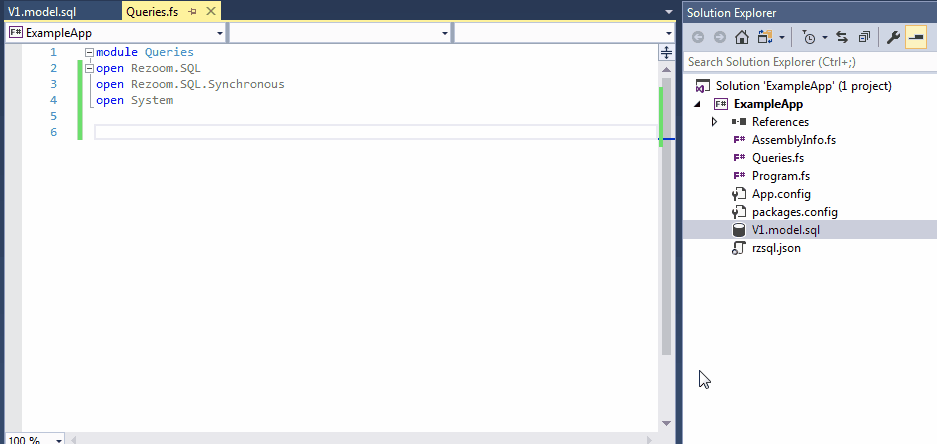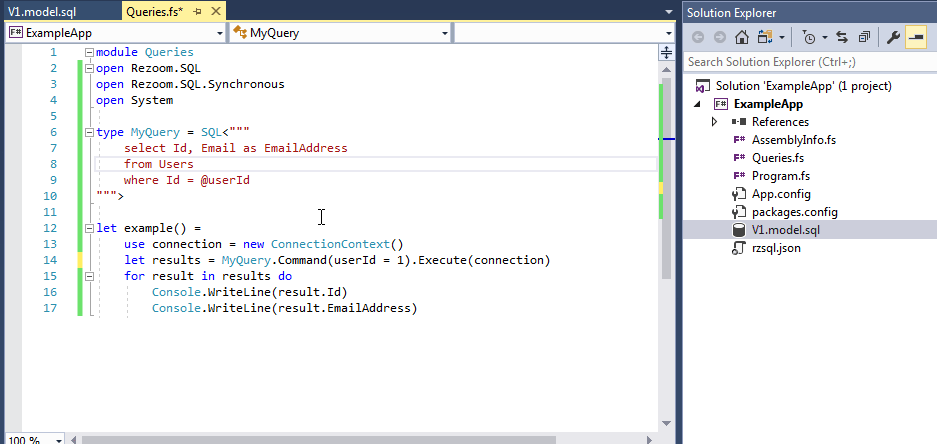rspeele / Rezoom.sql
Programming Languages
Projects that are alternatives of or similar to Rezoom.sql
Query playground -- try out the SQL dialect live!
Statically typed SQL for F#
Rezoom.SQL is an F# ORM for SQL databases.
It integrates with the F# compiler via a generative type provider to statically typecheck its own dialect of SQL. It knows how to translate this SQL dialect to various backends. Currently it supports SQLite, SQL Server, and PostgreSQL.
The type provider makes it fast and easy to write SQL statements, run them, and consume their results from your F# code with full type safety. You don't need to install any editor extensions or custom tooling, just add a NuGet package and you're off and running writing code like this:
Database schema inferred from migration scripts
In order to typecheck your queries, Rezoom.SQL has to know your database schema
(so it can know, for example, that the Id column in the Users table is an
int). It learns the schema by reading your migration scripts and observing what
tables and views are created, columns added, and so on.
When developing the first iteration of your application (or a new feature with its own migration script), it's easy to sketch out a model then go back and change it as you code, without having to touch a real database until you're ready to run.
Here's an example. You might want to refresh the page to start the GIF from the beginning.
Because this is a generative type provider, it makes plain old .NET types you
can use from other languages. That is, you can write an F# project that uses
Rezoom.SQL and defines your migrations and queries, then reference that from C#
or VB.NET projects and use the generated query types with no problem in those
langages. There is even an option to represent nullable types with C#-style
System.Nullable<T> instead of FSharpOption<T> to make this scenario work
extra smoothly.
Check out the query playground to see what kinds of SQL you can write.
The productivity of static typing
When you make schema changes -- for example, replacing FirstName and
LastName fields with a single FullName field -- it's comforting to know the
compiler will point out the queries you need to update.
The typechecker also tightens up the feedback loop, so you don't waste your time tracking down typos and trivial SQL mistakes you'd normally only encounter at runtime.
Here are just a handful of possible errors you'll be informed of at compile time and can fix in seconds. There are currently over 45 different error types that can be detected at compile time.
Mistyped table names
Incompatible data types
Selecting columns not included in a GROUP BY clause
Flexible migration order for working in teams
Since Rezoom.SQL understands the language, it knows that some migrations like
alter table X add column Y and alter table X add column Z can be run in any
order and produce the same effects.
When you're working with a team, you can take advantage of this to add the tables and columns you need for the feature you're coding, while your other team members do the same for their features -- without having to decide the One True Migration Order when you merge.
See details here.
Integration with Rezoom
You can use Rezoom.SQL by itself, as in the example code above.
But as the name implies, it's designed to work with Rezoom. When you use it with Rezoom, you can take advantage of automatic caching and combine units of business logic to share round trips to the database.
Automatic batching
With Rezoom, you build up a Plan to represent a transaction, which may involve
multiple SQL commands (or web API calls, or other high-latency data manipulation).
If you have one Plan called threeTrip that makes 3 queries, and another
called twoTrip that makes 2 queries, you can choose whether to combine them
sequentially for 5 round trips to the database...
let sequential =
plan {
let! x = threeTrip
let! y = twoTrip
return (x, y)
}
Or concurrently, for 3 round trips to the database. The first two query batches
sent to the database will include pending queries from both threePlan and
twoTrip:
let concurrent =
plan {
let! x, y = threeTrip, twoTrip
return (x, y)
}
Automatic caching
Each statically typed query comes with some useful info for caching:
- A compiler-generated ID
- A boolean indicating whether it could make sense to cache (has no side effects, does not use rand(), newid(), etc)
- A bitmask of the tables it reads from
- A bitmask of the tables it writes to
Rezoom uses this cache info to avoid unnecessarily re-querying for the same data
during the execution of a Plan (i.e. within a transaction).
This means if you have 30 different functions that call
LoadUserPermissions(currentUserId), only 1 query for permissions will actually
be run when you use those functions together in a transaction. Unless, of
course, you edit the permissions table during the course of the transaction, in
which case the cached result will automatically be invalidated and the
permissions re-queried next time they are requested.
This lets you safely check all the invariants you need for each method in your domain layer, without fear of causing mountains of redundant queries, and without any of the effort of writing your own caching layer.
Get started
To get started using RZSQL, read the tutorial. It'll get you up and running in 5 minutes or your money back.







